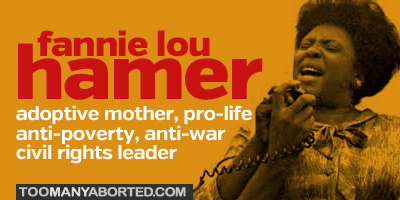Black History Month should be a time of celebration of achievement as well as an honest reflection on the impediments to freedom for all. As we look at those whose lives changed history, it’s quite evident that these champions for freedom have predominantly risen from the most impoverished and seemingly impossible situations. Civil rights leader Fannie Lou Hamer is one of many who broke through the generational shackles of poverty to live a life devoted to helping free others from the same bondage.
Fannie Lou (Townshend) Hamer was born into poverty in 1917 (the youngest of 20 children), which according to Planned Parenthood’s philosophy, was a circumstance worthy of eliminating her. (We expose this warped ideology in our TooManyAborted.com campaigns.) Since the age of 6, she worked in the cotton fields with her sharecropping family and was forced to leave school at the age of 12.
 But Fannie Lou Hamer defied the disproven narrative that poverty cannot birth greatness. She and her husband, Perry “Pap” Hamer, tirelessly toiled on a Mississippi plantation. Slavery just in a legally different form, he worked in the fields while she, armed with the ability to read and write, worked in the big House. In 1962, her life took an even more drastic turn.
But Fannie Lou Hamer defied the disproven narrative that poverty cannot birth greatness. She and her husband, Perry “Pap” Hamer, tirelessly toiled on a Mississippi plantation. Slavery just in a legally different form, he worked in the fields while she, armed with the ability to read and write, worked in the big House. In 1962, her life took an even more drastic turn.
She was diagnosed with a small uterine tumor, but instead of simply removing it, the doctor performed a hysterectomy without her consent. Pro-abortion activists often refer to Hamer’s ordeal as “Mississippi Appendectomies” a term Hamer coined. These unjust acts were done to thousands of black women across the country, like North Carolinian Elaine Riddick. But abortion activists don’t mention those sterilizations were heavily pushed, and performed by, Planned Parenthood, or that Fannie Lou Hamer was passionately pro-life. This traumatic experience was the catalyst for her social activism, to fight the incredible injustice that black Americans faced, daily, in America.
She fought for the right of black Americans to vote, risking her very life as she survived violent attacks for her public crusade for rights guaranteed by the Constitution. She never gave up. Hamer wanted to provide a better world for black children who were constantly the target of racist efforts that pushed birth control and other eugenic social policies masquerading as anti-poverty measures. In fact, Hamer was quoted as saying, during a White House Conference on Food, Nutrition, and Health: “I didn’t come to talk about birth control. I came here to get some food to feed poor, hungry people. Where are they carrying on that kind of talk?”
Ethyl Payne, a journalist for the Afro American, described Hamer as a “passionate believer in the right to life” in a March 1980 column. Payne reported that the freedom fighter “spoke out strongly against abortion as a means of genocide of blacks.”
 Fannie Lou Hamer was a prolife feminist who spoke with passion born of a life of hardships. She connected with people, black and white. As a victim of eugenic sterilization, racial discrimination, and a Democrat party that refused to racially integrate (hence her speech at the 1964 DNC Credentials Committee to demand black representation at the Convention), she spoke out against injustice leaving an indelible mark on the conscience of a nation. She was truly fearless.
Fannie Lou Hamer was a prolife feminist who spoke with passion born of a life of hardships. She connected with people, black and white. As a victim of eugenic sterilization, racial discrimination, and a Democrat party that refused to racially integrate (hence her speech at the 1964 DNC Credentials Committee to demand black representation at the Convention), she spoke out against injustice leaving an indelible mark on the conscience of a nation. She was truly fearless.
She used to sing “This Little Light of Mine” often. It was her anthem. She let her light shine outside and inside her home. Fannie Lou and “Pap” Hamer were adoptive parents who, due to the tragic loss of their adopted daughter Dorothy Jean and injuries sustained in war by their son-in-law, adopted their own grandchildren.
After her passing black journalist, Samuel F. Yette (who was fired by Newsweek for penning his book, “The Choice” which detailed Nixon’s eugenics and population control tactics) wrote that “Fannie Lou Hamer tried to feed and educate the children, to guard life and enhance its nobility.”
CLICK LIKE IF YOU’RE PRO-LIFE!
Pro-life activism is a continuum. Forget the favorite pro-abortion baseless mantra that we “don’t care about children once they’re born.” We care about life, no matter the stage, from conception until natural death. We may not agree with everyone on how that help is given, but all the evidence shows the extensive nature of how pro-life, pro-family, pro-restoration organizations and the Church care for the poor, the broken and those in need. History reminds us that when we fail to care for the least of these and deem them as “unwanted” or a “burden” (whether born or unborn), only violence and destruction follow.
Forty years of Roe have eliminated over 55 million possibilities. They’re gone. These are millions who could’ve helped breathe Life into the hopelessness and despair that still shackles urban communities. More than 15 million black lives, possible freedom fighters like Hamer, have been erased by abortion from the annals of history. But we will not forget them.
As Hamer once proclaimed: “Nobody’s free until everyone’s free.”
Here’s to a pro-life generation that is rising up, realizing that the best way to celebrate Black History is to fight to protect our very future—our Posterity.







